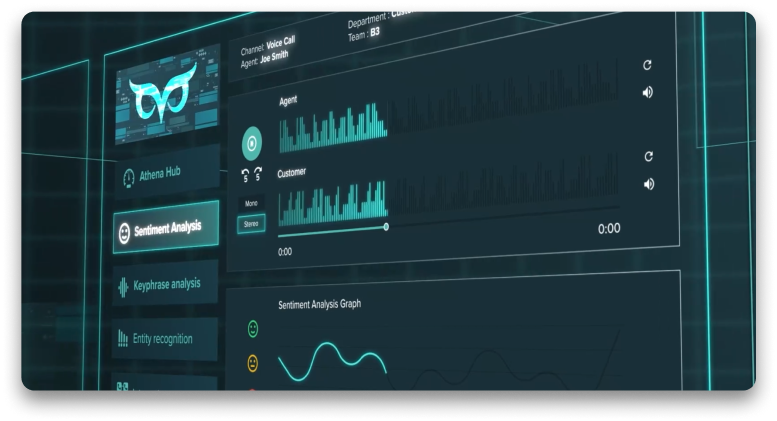Customer Service AI
Customer Service AI has proven an invaluable resource when it comes to enhancing customer interactions. In recent years, Artificial Intelligence has demonstrated its transformative potential in reshaping business operations across various industries. One area where this impact is particularly pronounced is in customer service.
But how does customer service AI operate, and what changes can we anticipate in the coming years? And what does this evolution mean for human call centre agents? This article aims to provide insights into these queries and provide you with a comprehensive understanding of why customer service AI is emerging as a transformative force in the customer engagement landscape. Let’s delve into it.
What is Customer Service AI?
Broadly, Customer Service AI refers to any software or technology utilizing Machine or Deep Learning, NLP (Natural Language Processing), ASR (Automatic Speech Recognition), probabilistic forecasting, or neural networks to execute tasks integral to customer service processes.
As these technologies evolve and expand, the definition and scope of Customer Service AI continually transform. The rapid pace of advancements in Artificial Intelligence contributes to the dynamic nature of what falls under the umbrella of Customer Service AI. This evolution persists as AI in the customer engagement field discovers new milestones and explores additional potential applications.
The exponential growth of Artificial Intelligence in recent years is expected to persist, leading to the establishment of new functionalities in Customer Service AI. Deloitte’s recent survey indicates a significant 79% of customer service leaders planning substantial investments in expanding their AI capabilities over the next two years. This strategic shift highlights the widespread recognition of AI’s potential to revolutionise customer engagement.
The adoption of AI technology offers a myriad of possibilities for refining customer interactions, with its influence becoming increasingly prominent in shaping how businesses interact with their customer base. This surge in AI adoption signifies an industry-wide acknowledgment that harnessing advanced technologies is crucial for optimising customer experiences and maintaining a competitive edge.
To demonstrate the importance of AI in the customer service landscape, let’s look at some statistics:
- By 2026, AI is expected to automate 10% of agent interactions, up from 1.6% in 2022 (Gartner).
- About 60% of customer service professionals save time with AI (Dialpad).
- Integrating AI with human agents improves satisfaction by 69% (Forrester).
- AI-equipped contact centres handle over twice the calls compared to those without AI (Dialpad).
- A notable 83% of customer service representatives believe AI helps them assist more people (Dialpad).
- Among organisations combining AI with human agents, 61% find it highly effective in enhancing customer satisfaction (Forrester).
- In such organisations, 59% of leaders find the combined approach highly effective in boosting customer retention and lifetime value (Forrester).
In the next section, we’ll take a look at some AI features or applications that can be especially beneficial in the context of customer service. Let’s get to it.
Customer Service AI Features
Conversational Bots
AI Conversational Bots, often interchangeably termed as chatbots, differ significantly from traditional chatbots. While chatbots operate on predefined scripts, AI Conversational Bots leverage advanced machine learning algorithms, such as deep learning and neural networks, to comprehend and generate human-like responses. Unlike rule-based chatbots, AI conversational bots adapt to user behaviour, learn from interactions, and excel in understanding context and user intent. Despite scepticism, a study by Gartner in 2023 showed chatbots resolving 52% of customer queries related to orders and purchases and 48% for returns or cancellations.
Conversational AI, when implemented effectively, becomes a valuable tool with the potential to outperform human agents in responsiveness to standard queries. It complements staff by handling routine inquiries, allowing human agents to focus on high-value interactions requiring a human touch or specialised expertise.
ASR IVRs
AI-powered Interactive Voice Response (IVR) systems, incorporating Automatic Speech Recognition (ASR) and Natural Language Processing (NLP), comprehend customer queries through voice commands, eliminating traditional menu-driven IVR systems. AI-driven IVRs intelligently direct calls, reducing wait times and handling routine inquiries efficiently. This automation optimises operational processes, enabling human agents to dedicate expertise to more intricate interactions, enhancing customer satisfaction and loyalty.
Sentiment Analysis
In call centres, Sentiment Analysis employs speech analytics AI to assess emotional states by scrutinising tone, vocabulary, and speech rhythm. Real-time insights into customer sentiment empower contact centre managers to enhance agent performance through targeted coaching sessions, ultimately contributing to improved customer satisfaction and loyalty. Sentiment Analysis fosters a more empathetic and responsive customer service environment, aligning with the goal of delivering exceptional customer experiences.
Interaction Analytics
Beyond Sentiment Analysis, speech analytics tools offer keyphrase analysis and Entity Recognition AI capabilities. Keyphrase analysis tracks frequently used words and phrases, providing comprehensive reports for anticipating market trends. Entity Recognition AI identifies specific entities mentioned during calls, such as company names or products, contributing to enhanced data-driven decision-making. These advanced tools efficiently categorise and report instances of entity references during customer service interactions, reducing man-hours dedicated to call assessment and routing.
The diverse functionalities of customer service AI have the potential to significantly streamline tasks, presenting a pivotal shift in customer service dynamics. The upcoming section delves into the integration of the human component within this evolving landscape.
Benefits of Customer Service AI
Enhanced Employee Engagement
AI holds the potential to significantly boost employee engagement and job satisfaction within the customer service domain. Through advanced Forecasting functions, AI can predict call volume fluctuations, aiding in proactive agent planning to meet service levels and alleviate pressure. Additionally, AI provides insights for issue resolution and efficient upselling, contributing to increased revenue with tried-and-tested scripts.
Deeper Customer Understanding
Improving the customer experience is paramount, and Customer Service AI proves invaluable in achieving this goal. Using features like Natural Language Processing (NLP) and speech analytics, AI records and transcribes customer interactions for easy review.
Transcriptions facilitate quick assessments, enabling supervisors to identify coaching areas and capture essential details. Other AI tools, such as Keyphrase Analysis and Entity Recognition, enhance contact centre analytics, unveiling trends in large customer datasets and providing insights into customer emotions for improved interaction strategies.
Sentiment Analysis stands out as a crucial AI tool, accurately assessing caller emotions through tone, vocabulary, and speech analysis. This capability empowers contact centre managers to offer targeted coaching for enhanced customer service skills. With AI-collected and analysed customer data, businesses can elevate customer satisfaction and evaluate campaign effectiveness.
Elevated Customer Experience
AI plays a pivotal role in delivering top-notch customer experiences. It provides timely and personalised information, analyses conversations at scale for improved first-call resolutions, and facilitates call deflection strategies. Successful call deflection, focused on data collection and analysis, enhances customer satisfaction by enabling quicker and better customer service through alternative channels.
Enable Self-Service and Call Deflection
While AI can’t replace all human agent functions, it excels in resolving simple requests. Routine, day-to-day inquiries fall under AI’s domain, allowing human agents to focus on more complex calls. AI-driven self-service automation has the potential to handle significant tasks, depending on accurate data availability. Prioritising data and analytics is crucial for AI to effectively respond to customers and contribute to more extensive self-service capabilities.
Cost Savings
A compelling advantage of Customer Service AI lies in significant cost reduction. Implementing technologies like Conversational AI chatbots automates large volumes of routine queries, enabling staff to concentrate on complex interactions. Gartner’s study projects that Conversational AI will reduce agent labour costs by $80 billion by 2026. However, while AI brings cost savings, the human touch remains indispensable in customer service, addressing individual concerns and interactions that AI cannot easily replace.
If you enjoyed reading this, you might also be interested in…
Call Centre Software
Omnichannel Contact Centre
Improving customer loyalty and brand reputation through Omnichannel
4 customer service agent frustrations that omnichannel can solve



